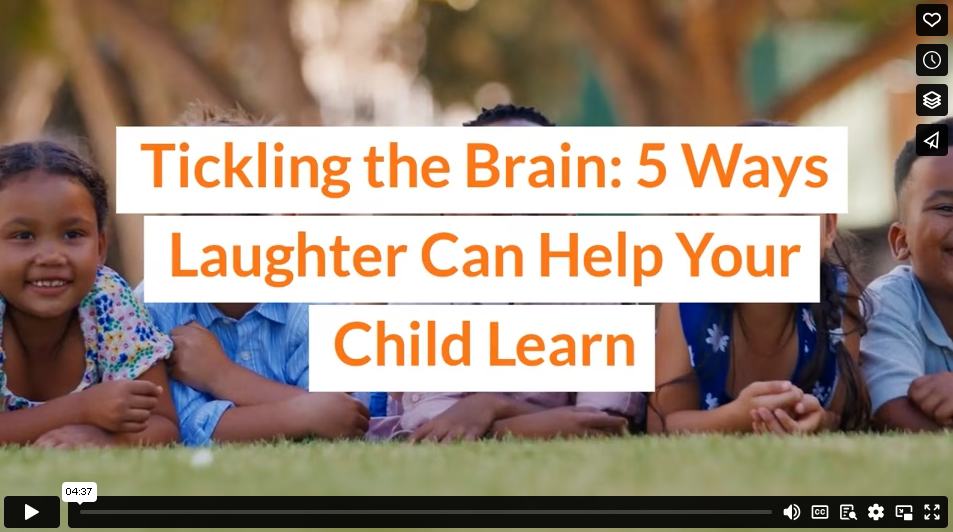It’s been a long day at the office. You were late thanks to road work, your boss was in a bad mood, and you only barely met the deadline for a massive project by staying late for the past two weeks. The stress has been weighing on your shoulders, growing heavier with each passing day. You need to take a load off.
So, what do you do? You put the kids to bed at a decent hour, crash onto the couch, and reach for the remote. Flipping through the selection of movies and shows, you pass by the dramas, thrillers, and action-heavy titles. You need something light, so you head to the comedy genre.
Think about the last time you had a good laugh. How did you feel afterward? Chances are, you felt better than you did before. Laughter is a pretty potent medicine, able to cure and curb a plethora of ailments. Its effect on the brain is impressive. But did you know that laughter and learning go hand-in-hand? Believe it or not, laughter is a crucial part of learning and stimulates brain growth and activity in a number of ways.
If your child is having trouble reading, stressing over an upcoming test, or despairing over a tricky math concept, laughter may be the solution. The team of elementary teachers at our private school in Atlanta have discovered the rich benefits of laughter in the classroom, and you can, too. So, if your curiosity has been tickled, read on. Together we’ll unlock the hidden benefits of laughter in learning.
1. Laughter is a Proven Stress-Reducer
Laughter releases endorphins in the brain, which, in addition to being a natural painkiller, also relieve sensations of stress and anxiety. These endorphins cause your brain to send signals through the nervous system to the rest of the body, lowering heart rate, blood pressure, and other physical responses to stress.
Feelings of stress are replaced with elevated feelings of calm and happiness, leading to an overall better mood. In addition, the brain activity associated with laughter also helps boost self-esteem and confidence.
2. Laughter Boosts Motivation and Engagement
Who doesn’t prefer to engage in activities they find enjoyable? It’s a natural response and one that can be utilized to enhance learning. By providing opportunities for laughter in educational settings, teachers and parents can help increase the child’s desire to engage. Lessons that are entertaining and fun are more likely to draw and maintain a student’s attention, and students are more likely to commit such lessons to memory.
3. Laughter Enhances Memory and Retention
Not only does laughter stimulate the brain to produce those happy endorphins, it also activates the areas of the brain connected with learning and memory. If you want your child to commit something to memory, try telling a funny story, singing a silly song, or sharing an amusing acronym. Information processed in a positive way is more likely to be committed to long-term memory.
4. Laughter Improves Communication Skills
Helping your child develop their unique sense of humor actually has its educational benefits. Children who can appreciate the wordplay, nuances, and timing of humor often have enhanced communication skills.
Jokes and silly stories are a great way to build a more diverse vocabulary. In addition, humor builds emotional intelligence, helps children become more apt at picking up on social cues, and encourages them to put themselves in another person’s shoes.
5. Laughter Builds Connections
In social settings, shared laughter builds bridges of connection. Sharing a laugh in the classroom is a great way to foster peer relationships between students, which builds comradery, promotes teamwork, and boosts empathy. Laughter increases feelings of community and belonging. When children feel comfortable with their peers, they’re more likely to feel a sense of security, allowing them to experience more effective learning.
In addition, students will feel more drawn to teachers who appropriately engage humor as a teaching tool. This causes them to seem more relatable and approachable, allowing for a deeper and more comfortable teacher-student connection. When a stronger connection is forged, students are more likely to actively engage and participate in the classroom.
Walt Disney once said that “laughter is no enemy to learning.” Instead, it is a trusty comrade, a powerful tool, and a worthy companion. Its benefits in education are vast and varied, and any education without humor would be lacking.
When parents and teachers learn to harness the power of humor, they unlock new levels of learning in the minds of their children and students. Humor’s ability to reduce stress, boost motivation, enhance memory, improve communication skills, and foster meaningful social connections is remarkable.
So, if you’re ready to help your child level up in learning, a little laughter will go a long way.
Video

Infographic
If your child is struggling with reading, stressed about a test, or finding math tricky, laughter may be the solution. Read the infographic to discover the benefits of laughter in learning.

